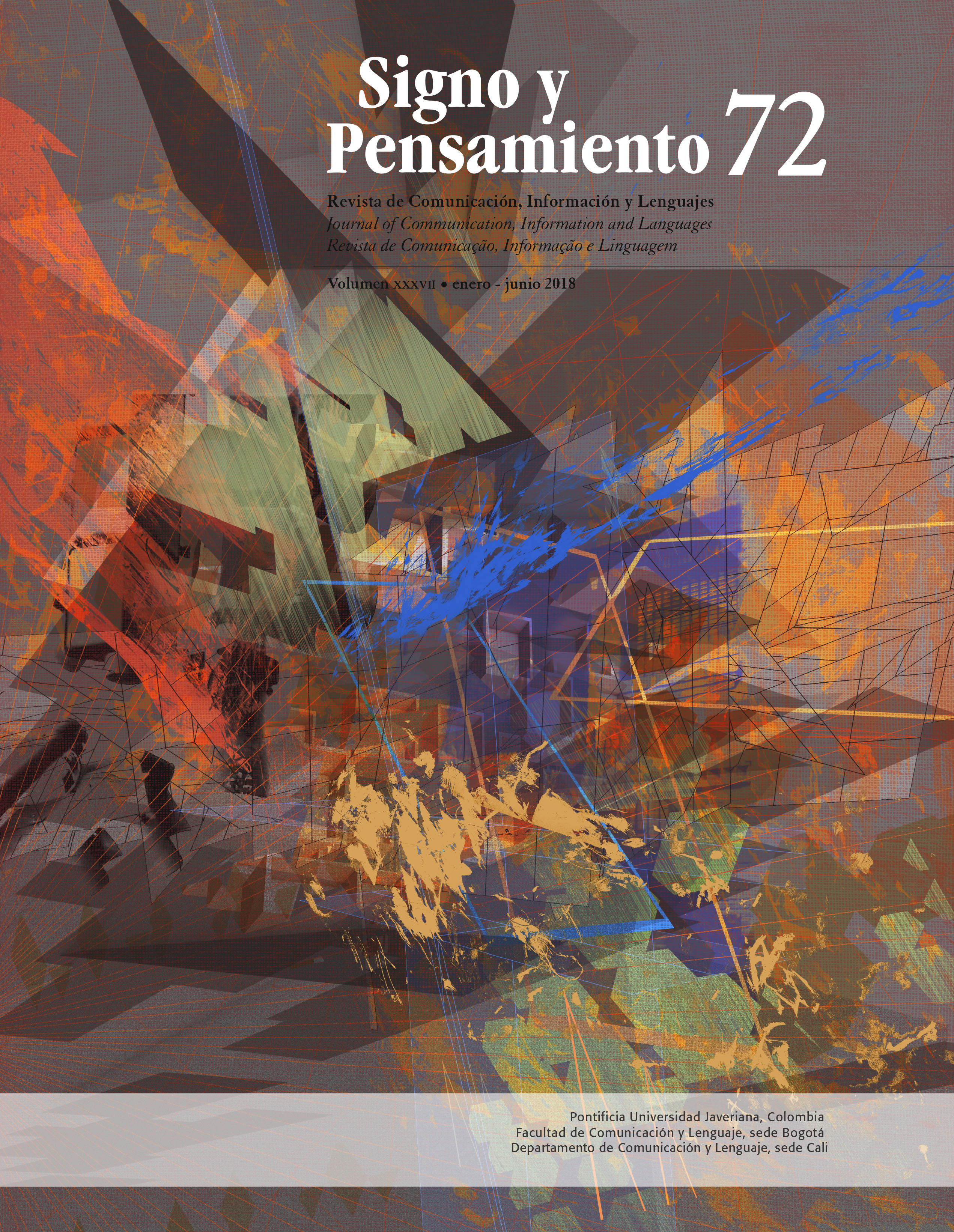Instruments to Validate Didactic Learning Environments (DLE) Intended to Educate Language and Communication Teachers on Diversity: A Tool for Language Didactics
##plugins.themes.bootstrap3.article.details##
Aiming at contributing to the development of didactics in the scientific field of education, this article proposes instruments to assess didactic learning environments (DLE) used in language-and-communication (L&C) teacher education within a diversity framework. A theoretical model on learning is presented for which validation instruments are proposed as a result of an architecture guided by applied principles of design theory and mutual intelligibility as a communities of practice principle to educate L&C teachers. The result is a battery of three instruments of qualitative and quantitative nature whose function is to assess the DLE in two moments: the planned design and the design put into practice.
language didactics, teacher formation, learning environments, validationdidáctica del lenguaje, formación de profesores, ambiente de aprendizaje, validacióndidática da linguagem, formação de professores, ambiente de aprendizado, validação
Blanco, R. (2008). “arco conceptual sobre educación inclusiva, 48a Reunión de la Conferencia Internacional de Educación (CIE). Ginebra: UNESCO. Recuperado febrero 07 2017 de http://www.ibe.unesco.org/fileadmin/user_upload/Policy_Dialogue/48th_ICE/CONFINTED_48_Inf_2__ Spanish.pdf
Brooks, F. P., Jr. (1987) No Silver Bullet. Essence and Accidents of Software Engineering IEEE Computer. En J. P.
Bowen & M. G. Hinchey (Eds.) High-Integrity System Specification and Design (pp 11-27). London: Springer Verlag.
Calderón, D., Soler, S., Borja, M., Muñoz, G., Rojas, G. & Portilla, L. (2014). Referentes curriculares con incorporación de tecnologías para la formación del profesorado de lenguaje y comunicación en y para la diversidad. (2ª ed.). Bogotá: Universidad Distrital Francisco José de Caldas.
Clements D. & Samara J. (2007) Effects in preschool mathematics curriculum: Summative research on the Building Blocks project. Journal for research in Mathematics Education, 38(2) 136- 163. https://doi.org/10.2307/30034954
Clements D. & Samara J. (2013). Rethinking Early Mathematics: What is Research-based curriculum for young children? English, L. y Mulligan, J. (eds.) Reconceptualizing Early Mathematics Learning, Springer Netherlands, Recuperado de https://doi.org/10.1007/978-94-007-6440-8_7
Clements D. & Samara J. . (2014). Learning and teaching early math: The learning trajectories approach. New York: Routledge.
Cobb, P., Confrey, J., diSessa, A., Lehrer, R., & Schauble, L. (2003). Design experiments in educational research. Educational Researcher, 32(1), 9 – 13. https://doi.org/10.3102/0013189X032001009
Cobb, P., & Gravemeijer, K. (2008). Experimenting to Support and Understand Learning Processes. En A. E. Kelly, R. A. Lesh, & J. Y. Baek, (Eds.) Handbook of Design Research Methods in Education: Innovations in Science, Technology, Engineering, and Mathematics Learning and Teaching, (pp. 68 – 95). Abingdon: Routledge.
Design-Based Research Collective (2003), Design-Based Research: An Emerging Paradigm for Educational Inquiry. Educational Researcher, 32(1), 5-8. https://doi.org/10.3102/0013189X032001005
Dresh, A., Pacheco, D., & Valle, J (2015). Design Science Research. Switzerland: Springer Cham Heildemberg.
Garello, M, Rinaudo, M., & Donolo, D. (2011) Valoración de los estudios de diseño como metodología innovadora en una investigación acerca de la construcción del conocimiento en la universidad. Revista de educación a distancia, 5, 1-34. Recuperado de https://www.um.es/ead/reddusc/5/garello.pdf
Gómez, P., & Lupiáñez, J. (2011). Trayectorias hipotéticas de aprendizaje en la formación inicial de profesores de matemáticas de secundaria. PNA. 1(2), 79-98. Recuperado de http://revistaseug.ugr.es/index.php/pna/article/view/6214
Gravemeijer, K., & Eerde, D van. (2009) Design research as a means for building a knowledge base for teachers and teaching in mathematics education. The Elementary School Journal, 109(5), 510-524. https://doi.org/10.1086/596999
León, O,. & López, A. (Ed.). (2016) Modelos de validación ALTER-NATIVA de objetos virtuales de aprendizaje en escenarios naturales. Bogotá: Universidad Distrital Francisco José de Caldas. México: Universidad Pedagógica Nacional.
Navarro, H. (2005). Manual de la evaluación de impacto de proyectos y programas de lucha contra la pobreza. Santiago de Chile : ILPES.
Ngang, T.K., Nair, S. & Prachak, B. (2014). Developing instruments to measure thinking skills and problem-solving skills among Malaysian primary school pupils. Procedia - Social and Behavioral Sciences, 116, 3760 – 3764. https://doi.org/ : 10.1016/j.sbspro.2014.01.837
Pa, N.A.N. & Tapsir, R. (2013). Analysis of instruments measuring values of mathematics education. Procedia - Social and Behavioral Sciences, 90, 449 – 457. https://doi.org/10.1016/j.sbspro.2013.07.114
Plomp, T., Anderson, R. E., & Kontogiannopoulou-Polydorides, G. (2013) Cross National Policies and Practices on Computers in Education (Technology-Based Education Series)(reprint of the original 1st ed. 1996 edition. Ciudad: Springer.
Quitián, S. Rojas, G., Medina, G., et al. (2014). La formación de profesores de lenguaje y comunicación en y para la diversidad: una experiencia en comunidades de práctica ALTER-NATIVA: Memorias del Congreso IX Conferencia Latinoamericana de objetos y tecnologías de aprendizaje. Manizales: Lugar/Institución de la conferencia.
Rittel, J., & Webber, M. (1984). Planning problems are Wicked Problems. En N. Cross (Ed.), Developments in Design Methodology, (pp. 135-144). New York: John Wiley &Sons.
Simon, M. A. (1995). Reconstructing mathematics pedagogy from a constructivist perspective. Journal for Research in Mathematics Education, 26(2), 114-145. https://doi.org/1D.23071749205.
Simon, M. A. (1996) The Sciences of the Artificial (3rd ed.), Cambridge: MIT Press.
Shulman, L. S. (1989). Paradigmas y programas de investigación en el estudio de la enseñanza: una perspectiva contemporánea. En M. C. Wittrock (Ed.), La investigación de la enseñanza, I. Enfoques, teorías y métodos Vol. I (pp. 9-91). Barcelona: Paidós/MEC.
Tapia-Gutierrez, C.P., & Cubo-Delgado, S. (2015). Design of an Instrument to Assess Social Skills in Teacher Training Programs. Procedia - Social and Behavioral Sciences, 197, 1074 – 1078. https://doi.org/ 10.1016/j.sbspro.2015.07.342
Tardif, M. (2004). Los saberes del docente y su desarrollo profesional. (Manzano, P. Trad.). Madrid: Narcea.
Tzur, R., & Simon, M. (2004). Distinguishing two stages of mathematics conceptual learning. International Journal of Science and Mathematics Education, 2(2), 287-304. https://doi.org/10.1007/s10763-004-7479-4
Vasco, C. E., Martinéz , A., & Vasco, E. (2008). Educación; Pedagogía y Didáctica una Perspectiva Epistemológica. En G. Hoyos (Ed.), Filosofía de la Educación (pp. 99-127). Bogotá: Trotta.
Wenger, E. (2001). Comunidades de práctica: aprendizaje significado e identidad. Buenos Aires: Paidós.
Wongwiwatthananukit, S, Newton, G., & Popovich, N. (2002). Development and validation of an instrument to assess the self-confidence of students enrolled in the advanced pharmacy practice experience. American Journal of Pharmaceutical Education, 66, 5-19. Recuperado de https://www.researchgate.net/profile/Supakit_Wongwiwatthananukit/publication/27238733_Development_and_validation_of_an_instrument_to_assess_the_self-confidence_of_students_enrolled_in_the_advanced_pharmacy_practice_experience_component_of_the_doctor_of_pharmacy_curriculum/links/00b4953514c3a8d0f3000000/Development-and-validation-of-an-instrument-to-assess-the-self-confidence-of-students-enrolled-in-the-advanced-pharmacy-practice-experience-component-of-the-doctor-of-pharmacy-curriculum.pdf
Zambrano, A. (2005). Didáctica, Pedagogía y Saber. Colección Seminarium. Bogotá: Editorial Magisterio.


